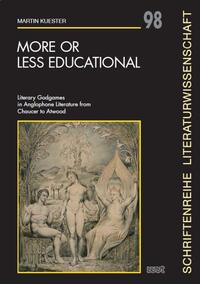
This volume brings together thoughts and ideas about “godgames” I gathered over many years and in various educational and academic contexts. The term godgame – or, most often, god game spelled in two words – appears quite regularly today in the context of computer games and science fiction and fantasy literature. What I want to show in this study is that such godgames, as defined by British novelist John Fowles, have existed for many centuries not only in the realm of fantasy literature and include many works that are central to the traditional literary canon(s). The godgame offers the chance of bringing together authors and works that have crept up at various points of my academic life and whose mention within the context of one single work of literary criticism might at first sight seem somewhat challenging: Chaucer’s Canterbury Tales, Shakespeare’s Measure for Measure and The Tempest, Milton’s Paradise Lost, and nineteenth- and twentieth- or even twenty-first-century authors from North America and Britain such as Herman Melville, Margaret Atwood, Robert Kroetsch, Michael Innes and Ian McEwan – and films such as The Game (1997) and The Truman Show (1998), or even science fiction movies such as The Matrix. CONTENTS 0. Preface 1 1. Godgames – a Fascinating and not so New Topic 4 2. The Prototypical Godgame Novel: John Fowles’s The Magus 8 3. Chaucerian Godgames in The Pardoner’s Tale 17 4. Shakespearian Godgames in Measure for Measure and The Tempest 25 5. Miltonic Godgames from Comus to Paradise Lost 36 6. Melvillean Godgames in The Confidence-Man 48 7. Godgames in Michael Innes’s Oxford (… and Elsinore) 58 8. Ian McEwan’s Godgames in Amsterdam and Machines Like Me 66 9. Robert Kroetsch: Godgames of a Novelist, Teacher and Scholar 74 10. Atwoodian Godgames: Oryx and Crake and Hag-Seed 82 11. Godgames in Science Fiction, Horror Narratives and Film 102 12. Stephen Scobie’s Godgames in the Griffin’s Wood 113 13. Godgames and Brexit: Stanley Johnson et al. 119 14. Being Taught and Teaching Through Godgames 127 15. Works Cited 131